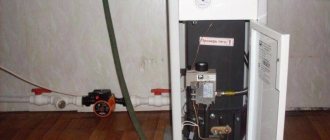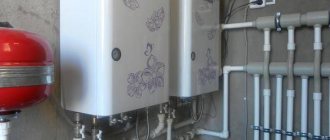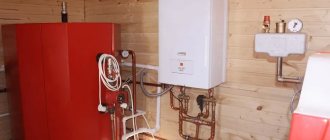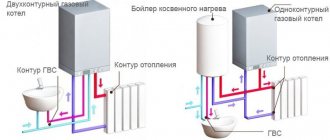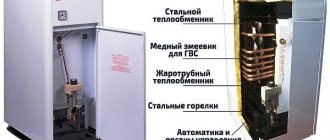The ideal operation of a gas boiler is considered to be a mode when the main burner burns stably with the flame as low as possible, i.e. The heat transfer from such combustion corresponds to the needs of the heated house. Otherwise, when a gas boiler is often turned on and off, its wear increases and gas consumption increases, since it is greater at the time of startup.
It is impossible to determine exactly why constant clocking occurs without seeing the boiler and the heating system diagram. However, we will consider all possible reasons for the frequent switching on and off of a gas boiler in descending order of their frequency, and we will give recommendations for solving the problem.
How to distinguish the norm from the problem?
If your boiler turns off briefly from time to time while working, this is a normal phenomenon; this is how an automatic system works, protecting the equipment from overheating and you from overpaying for bills for housing and communal services. The heat exchanger heats up periodically, heating the water to the set temperature.
But in the case when the boiler, after working for several minutes, immediately turns off without completing its direct task of heating, this indicates a malfunction. This is called a short cycle, which is dangerous not only due to insufficient heating of the room, but also large gas bills, and in the long term this malfunction will lead to serious damage to the boiler, which will require expensive repairs or even its complete replacement.
This is why it is important to take appropriate action as soon as you notice that your boiler has started to short cycle.
What is short cycle mode?
When your heating system doesn't need to be turned on, the heated water in the heat exchanger will naturally cool as heat escapes through the flue and around the boiler body itself.
The boiler has its own internal thermostat. When the boiler cycles briefly, this internal thermostat detects that the water in the heat exchanger is cooling and, although the temperature in your home has not dropped, starts the boiler to heat the water again. It doesn't take long for the heat exchanger to heat this small amount of water back up to the thermostat temperature, so the boiler quickly turns off again.
If the boiler is burning every few minutes, it is using gas but not heating your home. This wastes fuel which will increase your heating bills and carbon emissions, which in turn can cause damage to the heat exchanger as it is overworked.
If a heat exchanger malfunctions, it usually costs more than thirty thousand rubles (depending on the boiler model) without taking into account the labor costs of a gas safety engineer. Therefore, it is much more advisable to take appropriate measures before a major breakdown occurs at a time when replacing a faulty part does not become an expensive and time-consuming process.
Why does a gas boiler go out?
Often, residents of private houses are faced with a situation where a heating gas boiler goes out for no apparent reason.
The following may cause a shutdown:
- low pressure of natural gas;
- lack of oxygen to maintain the fire - the automation perceives this as a signal to shut down;
- the pilot light on the gas boiler is faulty and goes out;
- high water pressure in heating pipes;
- wind blowing out flames or weak draft.
There is no need to try to re-ignite the device. First you need to eliminate the cause of the problem.
The most common reasons for disconnection
There are a lot of reasons why a boiler goes out, which only a specialist can figure out, but there are a number of the most common problems that you can identify yourself. Next, experts have selected for you the top 6 reasons that may indicate the original source of the problem of a non-working boiler.
Gas valve
One of the most common problems faced by owners of gas boilers of various models, including expensive ones, is a malfunction of the gas valve.
The gas valve controls the gas supply to your boiler. When more heat is required, the valve opens to provide more fuel, and vice versa when the water reaches a certain temperature.
However, the following problems may occur with the gas valve:
- Blockage;
- Lack of traction;
- Damage to wires or other components.
Of course, it is ideal to seek help from a professional, but if this is not possible and you are sure that the problem of a non-working boiler lies in the gas valve, then 99% of a hundred the reason lies in incorrect adjustment.
When the gas valve is not properly adjusted, it will block when too much gas is supplied (because it is dangerous) or too little gas is supplied (because the boiler circuit board recognizes the problem of insufficient gas supply).
Blocked burner
Like internal combustion engines in cars, a boiler produces carbon as it burns gas. This gas can clog the burner as a result of combustion, and ultimately lead to inconsistent, inefficient and incorrect operation of the equipment, which can cause the boiler to fail to supply hot water and heating.
Expert opinion
Torsunov Pavel Maksimovich
If the burner is not damaged, cleaning the carbon buildup will eliminate the problem. If the burner is in poor condition, you may want to consider replacing it.
The problem with replacing burners is that they are not cheap. The exception is older boiler models, components for which can be found at an affordable price in any gas equipment store.
Lack of gas or insufficient gas pressure
Along with malfunctions of boiler components, a fairly common problem that affects the correct operation of heating equipment is insufficient gas pressure.
It is necessary to contact a gas engineer to check the gas pressure in the pipes coming in:
- To your gas meter;
- From your gas meter;
- To your boiler.
Checking the pressure will help determine if there is a problem with the gas supply and where the problem lies.
Like faulty gas valves that produce too much or too little gas, the boiler will lock up and display a fault code when there is insufficient gas pressure.
If your boiler refuses to ignite only in cold weather, it is possible that the problem lies in the gas meter.
Gas meters have a regulator, which can freeze at low temperatures. The solution here is to protect the meter and therefore the regulators from the cold.
Problems with the electrode and ignition terminal
The ignition electrode and wire may be the problem if your boiler won't light and you hear clicking or ticking sounds.
Problems associated with gas create intermittent operation of the boiler, or rather, it lights up and immediately turns off. However, without a functioning ignition wire and electrode, the boiler will not light at all. The condition of the electrode and ignition wire can be checked using a multimeter. If the problem is with any of these parts, it is much cheaper to replace them rather than repair them.
The fan does not rotate
When hot water or heating is required, the first thing to do is run the fan. The fan in the boiler does not cool the boiler, but it helps create air movement and draft. This draft pushes harmful gases from the boiler into the chimney, due to which the harmful gases escape without entering the house.
If the boiler circuit board does not recognize the operation of the fan, the boiler does not light up, but is blocked. This function allows you to prevent the release of harmful gases into the room that can lead to severe poisoning. Moreover, without blocking, prolonged ignition of the boiler due to gas emissions could lead to an explosion. In addition, blocking helps prevent further equipment damage.
So, if your boiler does not ignite and, at the same time, you do not hear the fan running, this may be where the problem lies.
Expert opinion
Torsunov Pavel Maksimovich
Fans can be expensive, so where possible it is better to have them repaired, such as installing a new motor, rather than replacing the entire unit.
The indicator light has gone out
If your boiler's pilot light goes out, the cause is usually debris blocking the gas flow. The light bulb's jet motor is miniature in size, so even a small amount of dirt can block it, causing the warning light to go out. This is why the boiler does not light up.
We hasten to reassure you: injectors are cheap to replace, and their removal, cleaning and installation does not take much time.
Lack of air draft in the system
An atmospheric gas boiler operates on the same principle as its ancestors - coal and wood stoves. Natural gas burns when air enters, and combustion products are carried out through the chimney outside the house.
Lack of traction in the system
In order for the entire system to work successfully, draft is necessary - a constant flow of air from the boiler burner to the head of the chimney. If there is no draft, the combustion products will not leave the combustion chamber at the required speed, and the boiler will go out.
Next, remove or disassemble the outlet pipe to the chimney. In modern boilers, this is simply done by loosening a couple of screws or loosening special quick-assembly clamps. After checking the draft, it becomes clear where the reason for its absence is - in the boiler itself or in the chimney.
During operation, the chimney not only becomes clogged with soot and other combustion products. Birds or collective insects (for example, wasps) can accidentally or intentionally get into it by making a nest. This happens in the summer when the chimney is idle.
What else can cause an ignition failure?
Less common, but the following problems may occur that lead to blocking of the heating unit.
Short circuit
Another cause of failure may be a short circuit. This often happens when the boiler is chosen incorrectly; it does not fit the dimensions of the house (too small and its power is not enough to heat the room, or, on the contrary, too large).
Component mismatch
If the boiler has already been repaired and elements that are not suitable for the model are installed in it, for example, an air pressure switch, the boiler may see a signal unusual for its operation and therefore is blocked.
Inconsistency with the dimensions of the heating system
Boilers should be selected according to the size of your home's heating system and your likely demand for hot water. If the boiler is too powerful, it will produce more steam than it can condense, causing a short cycle. In the past, engineers typically installed boilers that were larger than required to compensate for high losses. Boilers today are much more efficient, so there is no need to overload the boiler.
Pressure too high
Too much boiler pressure will also cause the boiler's automatic safety precautions to kick in and shut down the boiler.
As a rule, the pressure in the boiler should be between 1 and 2 bar. If reducing the pressure doesn't make any difference, try bleeding the radiators with excess air and water before calling a gas safety engineer. How do you solve the problem of boiler attenuation?
On your own Call a specialist
Ventilation holes are faulty
All components in a gas boiler are important, and a malfunction of one will certainly lead to a blockage of the entire unit. In particular, ventilation is of particular importance for the correct operation of the boiler. If the vents are not working properly, air will be trapped in the system, increasing the pressure until the burner switches off at pressuretrol. They may need to be cleaned or replaced.
Thermostat is faulty or incorrectly calibrated
The thermostat may be faulty or in a cold draft, affecting its ability to accurately measure the monitor's temperature. Therefore, it is unacceptable for the unit to remain in a cold room for a long time. If the thermostat has a mercury switch and is not leveled, this can also cause the problem.
Boiler is the right size, but overheated
When a boiler overheats, it will produce a lot of steam in a short period of time, which will increase the pressure in the unit and cause it to shut down for safety reasons.
Prevention measures
Breakdowns of gas equipment happen to everyone; it is impossible to insure against this.
However, there are a number of ways to reduce the risk of breakdowns:
- Scheduled diagnostics of gas equipment before the start of the heating season - a specialist will conduct an inspection, do a test run and tell you about all the nuances of this boiler.
- Selection of the correct operating mode of the boiler and pump.
- Periodic cleaning of all combustion chamber elements is carried out only by a specialist.
Expert opinion
Grebnev Vadim Savelievich
Heating system installer
You should always pay attention to whether the boiler is easy to ignite and whether it can always be done the first time. If there is any suspicion of a malfunction, it is better to call a technician and carry out an unscheduled diagnosis.
How to fix a boiler that is running in short cycle mode
We strongly advise against repairing the boiler yourself. Repairs and replacements of gas equipment must be carried out by an engineer.
Sometimes boiler repairs don't make financial sense. Instead, replacing the unit can be a much more cost-effective solution.
As boilers age, they become less reliable and require repairs more often. Those boiler repair bills will start to add up, and there will come a point where boiler replacement becomes your best option.
Depending on the type of boiler being installed, the cost of repairs can vary from thirty to sixty thousand rubles, including installation. Considering that some spare parts can cost between RUB 5,000 and RUB 10,000, this long-term investment in a boiler replacement may be the smartest move.
Expert opinion
Torsunov Pavel Maksimovich
You should consider replacing your boiler if your boiler is over 8 years old, breaks down regularly, engineers are having trouble finding replacement parts, or your gas consumption figures are rising.
Modern boilers are much more reliable than old units and come with a warranty period. The warranty will eliminate additional costs if the unit unexpectedly breaks down, and the new boiler will improve the efficiency of your heating system, which will help reduce your heating bills.
Lack of air for gas combustion
Problem related to lack of traction. Even if the boiler and chimney are in order, the lack of fresh air entering the combustion chamber of the burner can lead to the flame extinguishing.
From our school physics course we know that combustion requires oxygen. The powerful flame of the burner quickly burns it out of the air, turning it into carbon dioxide. If very little new air enters, the combustion stops, the flame subsides, and the automation turns off the gas supply.
The cause of air deficiency in the room where the boiler is located may be:
- tightly closed windows with seals;
- closed solid doors with a high threshold;
- improperly organized ventilation (air is taken in by a hood, exhaust fan or other active devices).
Question answer
If the boiler is not purchased according to the dimensions of the heating system, could this affect its further operation?
Yes. It is very important to purchase a boiler with full consideration of the size of the room for heating and the heating system, because either a too small or an overly powerful unit, due to a mismatch in size and power, will begin to work incorrectly, which will subsequently lead to breakdown.
If a gas boiler turns off after working for several minutes and then starts again, is this normal or a sign of a malfunction?
This is a sign that the boiler is running in short cycle mode, which, in turn, indicates a malfunction. It is urgent to take measures to eliminate it, because, on the one hand, your gas bills will increase significantly, on the other, operating the unit in a short cycle will soon lead to a complete breakdown of the boiler.
Can insufficient gas pressure affect the operation of the boiler?
Directly. You can check the pressure using a multimeter, and it is better to have a gas engineer carry out this work.
The boiler does not turn on and, at the same time, no operating sounds are heard. What could be the problem?
If you can’t hear the fans working, most likely the problem is with them. If the fan malfunctions, the boiler is automatically blocked to prevent the release of harmful gases into the house.
Can prolonged overcooling of the boiler affect the correctness of its subsequent switching on?
Yes. The reason is the thermostat, which reacts to low temperatures and locks up.
Preventive measures
To prevent damage to any boiler parts, special preventive measures are taken. Before the start of the heating season and after it, the unit must be serviced in a special way. If possible, it is disassembled and all components of the spare part are carefully inspected for damage. All faults must be eliminated, broken parts replaced with new ones or repaired.
The instructions for the device always include a list of preventive measures. must be strictly followed . The instructions for do-it-yourself repair of a Navien or Oasis mounted boiler contain information that you need to promptly remove all contaminants from the internal surfaces.
Due to the danger of gas boilers, you should not deal with problems yourself if you do not have any experience in repairing units. It is better to entrust the repair of the device to a specialist who will accurately identify broken parts and repair or replace them with new ones. During operation and maintenance, you must follow the manufacturer's instructions.
Checking the heating system: pipes, radiators, circulation pump
If the boiler power meets the requirements, you should pay attention to the elements of the heating system (all valves and thermostats, radiators, pipes); perhaps something is blocking or slowing down the movement of the coolant, make sure there is no air.
In systems with forced circulation, the cause may be the circulation pump. Firstly, in order to operate the boiler in vacuum mode, it is recommended to install it on the supply side (provided that the pump is designed for a temperature of 110-115°C). Secondly, it is worth trying to increase its speed; perhaps the speed of movement of the coolant is not enough and it lingers for a long time in the boiler heat exchanger.
